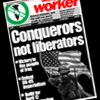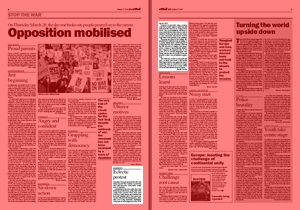 Papers: Weekly Worker: Eclectic protest
Papers: Weekly Worker: Eclectic protest Papers: Weekly Worker: Eclectic protest
Papers: Weekly Worker: Eclectic protest Click above to turn pageA brief, routine report, specially significant to me because my memories of that evening are so strong. We all knew the invasion was coming, but somehow it still felt like news when it came. The atmosphere was friendly, but subdued, and I sold papers that evening to people who would normally, I think, have called the police to report a communist paper seller. In the quiet of a suburban evening, it was difficult to imagine the similar communities half way round the world being bombed as we talked.
Click above to turn pageA brief, routine report, specially significant to me because my memories of that evening are so strong. We all knew the invasion was coming, but somehow it still felt like news when it came. The atmosphere was friendly, but subdued, and I sold papers that evening to people who would normally, I think, have called the police to report a communist paper seller. In the quiet of a suburban evening, it was difficult to imagine the similar communities half way round the world being bombed as we talked.
This is, incidentally, the only time I have ever been printed under a pseudonym: which the editor added without my knowledge. CPGB comrades, partly no doubt to create the impression that there were more than a couple of dozen of us, and partly out of sheer perversity, used a bewildering array of names, to the point that even other members were often not sure who had written what: but except for those who might face political victimisation at work, I could never see the point in either pretending to be bigger than we were, or pretending to be anyone else, and asked that my own name always be used in future.
Click here to download Weekly Worker issue 473.
More than 100 people answered the call of the Surrey Stop the War Coalition to protest the start of the war in the 'conservative' county town of Guildford.
Assembling in the town centre, they were addressed by John Morris, acting chair of the county STWC, Robert Cotton, vicar of the local Holy Trinity church, and a student from the Royal Grammar school. This eclectic mix was also reflected in the demonstration - christians, a few young 'anarchists', unaffiliated local people, as well as supporters of the CPGB and the SWP.
Protestors slowed traffic, using a crossing controlled by traffic lights to march back and forth across the road to hoots of support from drivers. One, Joyce Kirkpatrick, was struck by a taxi, which fled the scene before it could be identified. Holding her hurt arm, she refused to leave, and hoped only that the incident might attract some publicity to the campaign.
The group was joined by Sue Darling, who travelled from Guildford to Iraq on January 25 to join the 'human shield', before being forced to return last week. She complained of the bias the BBC showed in coverage of her group's efforts. Contrary to reports that this initiative had collapsed, she explained that, as she spoke, 50 or 60 western campaigners were facing, with the innocent people of Iraq, the prospect of their own government's aggression.
The event was covered by local press and radio, on which John Morris of the Pacifist Party argued that the case against the war remained the same as it had before it began, expressing concern about civilian deaths abroad and anti-muslim racism at home.
David Berlin